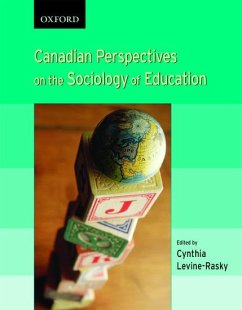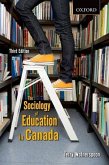Canadian Perspectives on the Sociology of Education
Herausgeber: Levine-Rasky, Cynthia
Canadian Perspectives on the Sociology of Education
Herausgeber: Levine-Rasky, Cynthia
- Broschiertes Buch
- Merkliste
- Auf die Merkliste
- Bewerten Bewerten
- Teilen
- Produkt teilen
- Produkterinnerung
- Produkterinnerung
This outstanding collection of original essays written by academics from coast-to-coast examines the complex relationship between school and society. Chapters range from the theoretical to the empirical, and from substantive concerns affecting student's lives to those affecting governance issues. Taking a critical approach, the text urges readers to ask difficult questions about teaching and schooling. By illustrating the multiple sociological forces that come into play for educators and learners, Canadian Perspectives on the Sociology of Education challenges the reductive and pragmatic approach adopted in conventional education courses.…mehr
Andere Kunden interessierten sich auch für
![The Sociology of Education in Canada: Critical Perspectives The Sociology of Education in Canada: Critical Perspectives]() Terry WotherspoonThe Sociology of Education in Canada: Critical Perspectives68,99 €
Terry WotherspoonThe Sociology of Education in Canada: Critical Perspectives68,99 €![A Draft Orthography for the Canadian Eskimo Towards a Future Unification With Greenlandic A Draft Orthography for the Canadian Eskimo Towards a Future Unification With Greenlandic]() A Draft Orthography for the Canadian Eskimo Towards a Future Unification With Greenlandic15,99 €
A Draft Orthography for the Canadian Eskimo Towards a Future Unification With Greenlandic15,99 €![Navigating The Canadian Real Estate Navigating The Canadian Real Estate]() Kyla LovellNavigating The Canadian Real Estate26,99 €
Kyla LovellNavigating The Canadian Real Estate26,99 €![Army Reserve Component Restructure: Does the Canadian Model Have Validity for US Army Reserve Components? Army Reserve Component Restructure: Does the Canadian Model Have Validity for US Army Reserve Components?]() J. P. MacintyreArmy Reserve Component Restructure: Does the Canadian Model Have Validity for US Army Reserve Components?60,99 €
J. P. MacintyreArmy Reserve Component Restructure: Does the Canadian Model Have Validity for US Army Reserve Components?60,99 €![Specialized Assault Units of the World War I Western Front: A Comparative Study of the German Stormtrooper Battalions, and Canadian Trench Raiders - W Specialized Assault Units of the World War I Western Front: A Comparative Study of the German Stormtrooper Battalions, and Canadian Trench Raiders - W]() Christopher J. GhizSpecialized Assault Units of the World War I Western Front: A Comparative Study of the German Stormtrooper Battalions, and Canadian Trench Raiders - W20,99 €
Christopher J. GhizSpecialized Assault Units of the World War I Western Front: A Comparative Study of the German Stormtrooper Battalions, and Canadian Trench Raiders - W20,99 €![Telemedicine for the Canadian Forces: What Is a Viable Satellite Means for the Canadian Forces to Deliver Telemedicine Information Between a Deployed Telemedicine for the Canadian Forces: What Is a Viable Satellite Means for the Canadian Forces to Deliver Telemedicine Information Between a Deployed]() Timothy W. WalrodTelemedicine for the Canadian Forces: What Is a Viable Satellite Means for the Canadian Forces to Deliver Telemedicine Information Between a Deployed61,99 €
Timothy W. WalrodTelemedicine for the Canadian Forces: What Is a Viable Satellite Means for the Canadian Forces to Deliver Telemedicine Information Between a Deployed61,99 €![The Canadian Journal for Teacher Research - Teacher and Student Efficacy The Canadian Journal for Teacher Research - Teacher and Student Efficacy]() Jim ParsonsThe Canadian Journal for Teacher Research - Teacher and Student Efficacy15,99 €
Jim ParsonsThe Canadian Journal for Teacher Research - Teacher and Student Efficacy15,99 €-
-
-
This outstanding collection of original essays written by academics from coast-to-coast examines the complex relationship between school and society. Chapters range from the theoretical to the empirical, and from substantive concerns affecting student's lives to those affecting governance issues. Taking a critical approach, the text urges readers to ask difficult questions about teaching and schooling. By illustrating the multiple sociological forces that come into play for educators and learners, Canadian Perspectives on the Sociology of Education challenges the reductive and pragmatic approach adopted in conventional education courses.
Produktdetails
- Produktdetails
- Verlag: Oxford University Press, USA
- Seitenzahl: 392
- Erscheinungstermin: 12. März 2010
- Englisch
- Abmessung: 226mm x 178mm x 19mm
- Gewicht: 603g
- ISBN-13: 9780195425307
- ISBN-10: 0195425308
- Artikelnr.: 25838963
- Verlag: Oxford University Press, USA
- Seitenzahl: 392
- Erscheinungstermin: 12. März 2010
- Englisch
- Abmessung: 226mm x 178mm x 19mm
- Gewicht: 603g
- ISBN-13: 9780195425307
- ISBN-10: 0195425308
- Artikelnr.: 25838963
Cynthia Levine-Rasky is an Assistant Professor in the Department of Sociology at Queen's University in Kingston, Ontario. Her current and proposed research concerns the intersections of gender, race/ethnicity, and class among parents involved in choosing schools for their children. This research is related to the rise in studies of power as expressed through masculinity, whiteness, and middle-class living, rather than to research concerning oppression and marginality (women, racialized groups, and the working-class). Levine-Rasky is interested in what makes some parents 'choose' a school, how their decisions are influenced by changes in the student population, and how, in turn, their decisions bring about the reproduction of social inequalities. Related issues are concerned with the social and political context in which schooling is regarded as a commodity out of which the parent/consumer must choose the 'best' for their child, and also what the 'best' means for parents. In tandem with these questions, Cynthia is exploring the dynamics of Jewish identity.
* Introduction
* Section One: Theory and Practice
* 1: Scott Davies and David Zarifa: New Institutional Theory and the
Weberian Tradition
* 2: Jane Gaskell: Feminist Approaches to the Sociology of Education in
Canada
* 3: Jo-Anne Dillabough: Assessing Pierre Bourdieu's Theoretical
Legacies for Feminist Sociology of Education: Culture, Self, and
Society
* 4: George J. Sefa Dei: Theorizing Anti-Racism
* 5: Joyce Barakett and M. Ayaz Naseem: Multicultural, Anti-Racist
Education, and Black Feminist Pedagogy
* 6: Lisa Farley and Judith P. Robertson: The Stranger Side of
Education: A Dialogue with Psychoanalysis
* Section Two: Process and Equity
* 7: Alison Taylor and Harvey Krahn: Streaming In/For the New Economy
* 8: Rebecca Raby: School Rules, Bodily Discipline, Embodied Resistance
* 9: Jennifer R. Kelly and Lorin G. Yochim: African Canadian Students,
Identity, and Diaspora Literacy
* 10: Verna St. Denis: Rethinking Culture Theory in Aboriginal
Education
* 11: Gerald Walton: Addressing Homophobia and Heterosexism for all
Children in Canadian Schools: A Responsibility of Educational Leaders
* 12: Wolfgang Lehmann: Class Encounters: Working Class Students at
University
* 13: Jessica Ringrose: 'The Future is Female': Mapping Postmodernist
Panics over Failing Boys and Over-Successful Girls in the UK and
Canada
* 14: Michael Corbett: The Road to School Leads Out of Town: Rurality
and Schooling in Atlantic Canada
* Section Three: Reforms and Consequences
* 15: Claude Lessard and André Brassard: Education Governance in
Canada, 1900-2003: Trends and Significance
* 16: Charles Ungerleider and Ernest Krieger: British Columbia: Whose
Education? What Reform?
* 17: Ann Vibert: Painting the Mountain Green: Discourses of
Accountability and Critical Practice
* 18: Goli Rezai-Rashti: The Assault of Neo-Liberalism on Education
Reform, Restructuring, and Teaching in Ontario Secondary Schools
* 19: Kari Dehli: Race, Parents, and the Organization of Education
Policy Discourse in Ontario
* 20: Don Dippo, Marcela Duran, Jen Gilbert, and Alice Pitt: Public
Schooling, Public Knowledge, and the Education of Public School
Teachers
* 21: Claire Polster: The Privatization of Higher Education in Canada
* Section One: Theory and Practice
* 1: Scott Davies and David Zarifa: New Institutional Theory and the
Weberian Tradition
* 2: Jane Gaskell: Feminist Approaches to the Sociology of Education in
Canada
* 3: Jo-Anne Dillabough: Assessing Pierre Bourdieu's Theoretical
Legacies for Feminist Sociology of Education: Culture, Self, and
Society
* 4: George J. Sefa Dei: Theorizing Anti-Racism
* 5: Joyce Barakett and M. Ayaz Naseem: Multicultural, Anti-Racist
Education, and Black Feminist Pedagogy
* 6: Lisa Farley and Judith P. Robertson: The Stranger Side of
Education: A Dialogue with Psychoanalysis
* Section Two: Process and Equity
* 7: Alison Taylor and Harvey Krahn: Streaming In/For the New Economy
* 8: Rebecca Raby: School Rules, Bodily Discipline, Embodied Resistance
* 9: Jennifer R. Kelly and Lorin G. Yochim: African Canadian Students,
Identity, and Diaspora Literacy
* 10: Verna St. Denis: Rethinking Culture Theory in Aboriginal
Education
* 11: Gerald Walton: Addressing Homophobia and Heterosexism for all
Children in Canadian Schools: A Responsibility of Educational Leaders
* 12: Wolfgang Lehmann: Class Encounters: Working Class Students at
University
* 13: Jessica Ringrose: 'The Future is Female': Mapping Postmodernist
Panics over Failing Boys and Over-Successful Girls in the UK and
Canada
* 14: Michael Corbett: The Road to School Leads Out of Town: Rurality
and Schooling in Atlantic Canada
* Section Three: Reforms and Consequences
* 15: Claude Lessard and André Brassard: Education Governance in
Canada, 1900-2003: Trends and Significance
* 16: Charles Ungerleider and Ernest Krieger: British Columbia: Whose
Education? What Reform?
* 17: Ann Vibert: Painting the Mountain Green: Discourses of
Accountability and Critical Practice
* 18: Goli Rezai-Rashti: The Assault of Neo-Liberalism on Education
Reform, Restructuring, and Teaching in Ontario Secondary Schools
* 19: Kari Dehli: Race, Parents, and the Organization of Education
Policy Discourse in Ontario
* 20: Don Dippo, Marcela Duran, Jen Gilbert, and Alice Pitt: Public
Schooling, Public Knowledge, and the Education of Public School
Teachers
* 21: Claire Polster: The Privatization of Higher Education in Canada
* Introduction
* Section One: Theory and Practice
* 1: Scott Davies and David Zarifa: New Institutional Theory and the
Weberian Tradition
* 2: Jane Gaskell: Feminist Approaches to the Sociology of Education in
Canada
* 3: Jo-Anne Dillabough: Assessing Pierre Bourdieu's Theoretical
Legacies for Feminist Sociology of Education: Culture, Self, and
Society
* 4: George J. Sefa Dei: Theorizing Anti-Racism
* 5: Joyce Barakett and M. Ayaz Naseem: Multicultural, Anti-Racist
Education, and Black Feminist Pedagogy
* 6: Lisa Farley and Judith P. Robertson: The Stranger Side of
Education: A Dialogue with Psychoanalysis
* Section Two: Process and Equity
* 7: Alison Taylor and Harvey Krahn: Streaming In/For the New Economy
* 8: Rebecca Raby: School Rules, Bodily Discipline, Embodied Resistance
* 9: Jennifer R. Kelly and Lorin G. Yochim: African Canadian Students,
Identity, and Diaspora Literacy
* 10: Verna St. Denis: Rethinking Culture Theory in Aboriginal
Education
* 11: Gerald Walton: Addressing Homophobia and Heterosexism for all
Children in Canadian Schools: A Responsibility of Educational Leaders
* 12: Wolfgang Lehmann: Class Encounters: Working Class Students at
University
* 13: Jessica Ringrose: 'The Future is Female': Mapping Postmodernist
Panics over Failing Boys and Over-Successful Girls in the UK and
Canada
* 14: Michael Corbett: The Road to School Leads Out of Town: Rurality
and Schooling in Atlantic Canada
* Section Three: Reforms and Consequences
* 15: Claude Lessard and André Brassard: Education Governance in
Canada, 1900-2003: Trends and Significance
* 16: Charles Ungerleider and Ernest Krieger: British Columbia: Whose
Education? What Reform?
* 17: Ann Vibert: Painting the Mountain Green: Discourses of
Accountability and Critical Practice
* 18: Goli Rezai-Rashti: The Assault of Neo-Liberalism on Education
Reform, Restructuring, and Teaching in Ontario Secondary Schools
* 19: Kari Dehli: Race, Parents, and the Organization of Education
Policy Discourse in Ontario
* 20: Don Dippo, Marcela Duran, Jen Gilbert, and Alice Pitt: Public
Schooling, Public Knowledge, and the Education of Public School
Teachers
* 21: Claire Polster: The Privatization of Higher Education in Canada
* Section One: Theory and Practice
* 1: Scott Davies and David Zarifa: New Institutional Theory and the
Weberian Tradition
* 2: Jane Gaskell: Feminist Approaches to the Sociology of Education in
Canada
* 3: Jo-Anne Dillabough: Assessing Pierre Bourdieu's Theoretical
Legacies for Feminist Sociology of Education: Culture, Self, and
Society
* 4: George J. Sefa Dei: Theorizing Anti-Racism
* 5: Joyce Barakett and M. Ayaz Naseem: Multicultural, Anti-Racist
Education, and Black Feminist Pedagogy
* 6: Lisa Farley and Judith P. Robertson: The Stranger Side of
Education: A Dialogue with Psychoanalysis
* Section Two: Process and Equity
* 7: Alison Taylor and Harvey Krahn: Streaming In/For the New Economy
* 8: Rebecca Raby: School Rules, Bodily Discipline, Embodied Resistance
* 9: Jennifer R. Kelly and Lorin G. Yochim: African Canadian Students,
Identity, and Diaspora Literacy
* 10: Verna St. Denis: Rethinking Culture Theory in Aboriginal
Education
* 11: Gerald Walton: Addressing Homophobia and Heterosexism for all
Children in Canadian Schools: A Responsibility of Educational Leaders
* 12: Wolfgang Lehmann: Class Encounters: Working Class Students at
University
* 13: Jessica Ringrose: 'The Future is Female': Mapping Postmodernist
Panics over Failing Boys and Over-Successful Girls in the UK and
Canada
* 14: Michael Corbett: The Road to School Leads Out of Town: Rurality
and Schooling in Atlantic Canada
* Section Three: Reforms and Consequences
* 15: Claude Lessard and André Brassard: Education Governance in
Canada, 1900-2003: Trends and Significance
* 16: Charles Ungerleider and Ernest Krieger: British Columbia: Whose
Education? What Reform?
* 17: Ann Vibert: Painting the Mountain Green: Discourses of
Accountability and Critical Practice
* 18: Goli Rezai-Rashti: The Assault of Neo-Liberalism on Education
Reform, Restructuring, and Teaching in Ontario Secondary Schools
* 19: Kari Dehli: Race, Parents, and the Organization of Education
Policy Discourse in Ontario
* 20: Don Dippo, Marcela Duran, Jen Gilbert, and Alice Pitt: Public
Schooling, Public Knowledge, and the Education of Public School
Teachers
* 21: Claire Polster: The Privatization of Higher Education in Canada







